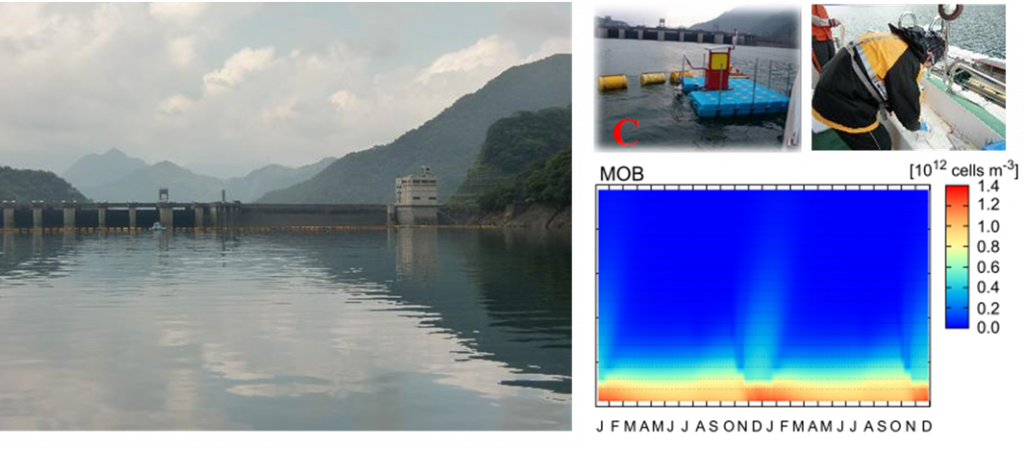Scientist of National Taiwan University leading the team with scientists in Japan won 18th Ecological Research Paper Award & 6th Taiwan-Japan Ecology Workshop will be organized in Tainan 2018
Fei-Tsui Reservoir (FTR) and the simulated seasonal variations of depth profile of methane oxidizing bacteria (MOB).
Professor Takeshi Miki, Professor Chih-hao Hsieh and Fuh-Kwo Shiah from the Institute of Oceanography and students Pei-Chi Ho and Chun-Wei Chang from Taiwan International Graduate Program, Academia Sinica, together with scientists in Japan (Kyoto University, Research Center for Humanity and Nature, Hokkaido University, Yamaguchi University, and Akita Prefectural University), propose a new conceptual model of pelagic-benthic coupling mediated by vertically stratified diverse methane oxidizing bacteria (MOB). This study, published in Ecological Research (2017/12), is based on the long-term observational data at Fei-Tsui Reservoir (FTR) in Taipei integrated into ecosystem modeling approach and won 18th Ecological Research Paper Award (link1) and available as an open access article (link2).
Growing evidence indicates that the global methane budget may be influenced by methane release from freshwater systems. However, freshwater studies have been limitedly conducted in arctic, boreal and temperate regions. The related studies in subtropical and tropical regions mainly focused on shallow lakes only. By taking advantage of focusing on the deep lake (FTR), this study filled the research gap and completely revised our current understanding of the fate of methane produced in the bottom of the lake under interannual variations of climate (e.g. the frequency and strength of typhoon). The diversity of MOB facilitates the oxidization of methane produced in the bottom of the lake, which resulted in a minor role of the bottom-produced methane in methane release from the lake surface. At the same time, we discovered the impact of inter-annual climate variations affected the fate of the methane, which as an important implication on the lake responses under the tendency of global warming.
This article is a part of the special feature in Ecological Research that is based on 5th Taiwan-Japan Ecology Workshop. Prof. Hsieh and Miki have lead the organization of Taiwan-Ecology Workshops since 2008. This relationship has lasted almost 10 years. Specific purposes of the workshops include facilitating research co-operation and comparative studies between Taiwan and Japan, encouraging students and scientists to participate in such cooperation, exchanging ideas among scientists and students, and discussing important ecological and environmental issues of the 21st century. The workshops were held at NTU in 2008 and 2009, Hokkaido University in 2012, Donghua University in 2014, and Ryukoku University in 2016. Ecologists in Taiwan will again host the workshop in November this year, at National Cheng Kung University in Nov22-26 (link3).
Reference:
“Integrating isotopic, microbial, and modeling approaches to understand methane dynamics in a frequently disturbed deep reservoir in Taiwan.”
Masayuki Itoh, Hisaya Kojima, Pei-Chi Ho, Chun-Wei Chang, Tzong-Yueh Chen, Silver Sung-Yun Hsiao, Yuki Kobayashi, Megumi Fujibayashi, Shih-Ji Kao, Chih-hao Hsieh, Manabu Fukui, Noboru Okuda, Takeshi Miki*, Fuh-Kwo Shiah*. Ecological Research 32: 861-871.
“Establishment of an ecological research network involving Taiwan and Japan: developing a better understanding of ecological phenomena unique to East Asia”
Masahiro Nakamura, Chih-hao Hsieh, Takeshi Miki, Michio Kondoh. Ecological Research 32 779-781











